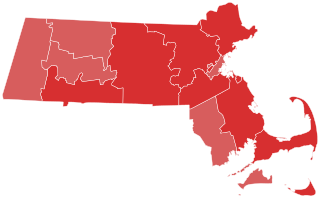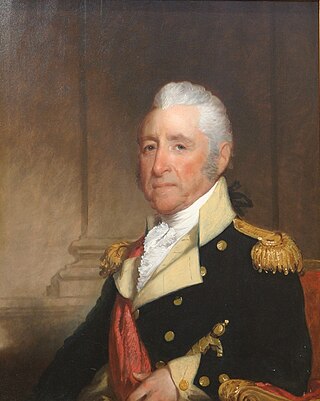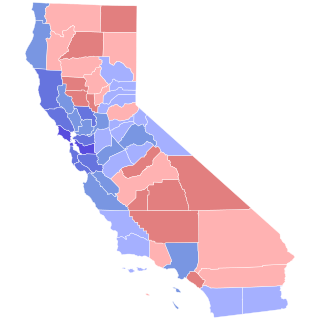
William Eustis was an early American physician, politician, and statesman from Massachusetts. Trained in medicine, he served as a military surgeon during the American Revolutionary War, notably at the Battle of Bunker Hill. He resumed medical practice after the war, but soon entered politics.

Harrison Gray Otis, was a businessman, lawyer, and politician, becoming one of the most important leaders of the United States' first political party, the Federalists. He was a member of the Otis family.

The 1994 Massachusetts gubernatorial election was held on November 8, 1994. Incumbent Republican governor Bill Weld won reelection as Governor of Massachusetts by the largest margin in state history, winning every single county and all but 6 of the state's 351 municipalities. As of 2024, this is the most recent election in which Boston, Somerville, Lawrence, Chelsea, Brookline, Northampton, Provincetown, Monterey, Great Barrington, Ashfield, Williamstown, Williamsburg, Shelburne, Sunderland, and Pelham voted for the Republican candidate for governor.

John Brooks was an American doctor, military officer, and politician from Massachusetts. He served as the 11th Governor of Massachusetts from 1816 to 1823, and was one of the last Federalist officials elected in the United States.

The 1810 New York gubernatorial election was held in April 1810. Governor Daniel D. Tompkins was elected to a second term in office over Jonas Platt.

The 1816 New York gubernatorial election was held in April 1816 to elect the Governor and Lieutenant Governor of New York. Governor Tompkins had received the nomination of the Congressional Caucus for Vice President as James Monroe's running-mate. Senator King would receive the votes for President of those Federalist Electors chosen that fall.

The 1992 United States Senate special election in California took place on November 3, 1992, at the same time as the regular election to the United States Senate in California. Feinstein defeated future California governor Gray Davis in the Democratic primary, while Seymour defeated William E. Dannemeyer in the Republican primary.
Since the Great Depression, Rhode Island politics have been dominated by the Rhode Island Democratic Party, and the state is considered part of the Democrats' "Blue Wall." Democrats have won all but four presidential elections since 1928, with the exceptions being 1952, 1956, 1972, and 1984. The Rhode Island Republican Party, although virtually non-existent in the Rhode Island General Assembly, has remained competitive in gubernatorial elections, having won one as recently as 2006. Until 2014, Democrats had not won a gubernatorial election in the state since 1992, and it was not until 2018 that they won one by double digits. The Rhode Island General Assembly has continuously been under Democratic control since 1959.

The 1822–23 United States Senate elections were held on various dates in various states. As these U.S. Senate elections were before the ratification of the Seventeenth Amendment in 1913, senators were chosen by state legislatures. Senators were elected over a wide range of time throughout 1822 and 1823, and a seat may have been filled months late or remained vacant due to legislative deadlock. In these elections, terms were up for the senators in Class 2.

The 1824–25 United States Senate Elections were held on various dates in various states. As these U.S. Senate elections were prior to the ratification of the Seventeenth Amendment in 1913, senators were chosen by state legislatures. Senators were elected over a wide range of time throughout 1824 and 1825, and a seat may have been filled months late or remained vacant due to legislative deadlock. In these elections, terms were up for the senators in Class 3.

The 1826 Massachusetts gubernatorial election was held on April 3.

The 1824 Massachusetts gubernatorial election was held on April 5.

The 1822 Massachusetts gubernatorial election was held on April 1.

The 1821 Massachusetts gubernatorial election was held on April 2, 1821.

The 1820 Massachusetts gubernatorial election was held on April 3, 1820.

The 1820 New Hampshire gubernatorial election was held on March 14, 1820.

The 1821 New Hampshire gubernatorial election was held on March 13, 1821.

The 1823 New Hampshire gubernatorial election was held on March 11, 1823.

The 1817 New Hampshire gubernatorial election was held on March 11, 1817.




















